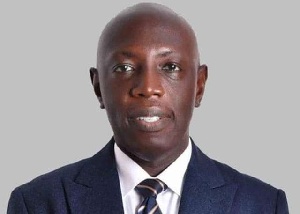- Home - News
- Elections 2024
- News Archive
- Crime & Punishment
- Politics
- Regional
- Editorial
- Health
- Ghanaians Abroad
- Tabloid
- Africa
- Religion
- Photo Archives
- Press Release
General News of Thursday, 22 May 2025
Source: www.ghanawebbers.com
Cedi appreciation driven by mixed domestic and global factors - Prof. Quartey
Professor Peter Quartey is the Director of the Institute of Statistical, Social and Economic Research (ISSER). He recently discussed the cedi's appreciation. He believes it results from a mix of domestic and international factors.
Prof. Quartey noted that despite challenges, some domestic policies are helping. He spoke with the Ghana News Agency after a conference in Accra. The conference focused on financial realities in Africa during crises.
The theme was “Cash in Crisis in Africa: Navigating Financial Realities in Times of Disruption.” It aimed to explore how policy and governance affect cash circulation and accessibility in Africa's digitized society.
He highlighted the government's Gold for Reserves program as beneficial. This program helps cushion global economic instability's impact. Prof. Quartey mentioned improvements in fiscal discipline as well.
He stated that the government is spending within its revenue limits. "If we had an excessive deficit, we would borrow more," he explained. Increased borrowing would raise interest payments and pressure the cedi, but this is not happening now.
He praised better coordination between the Ministry of Finance and the Bank of Ghana. There is now a more unified approach to economic management. "The Bank of Ghana is more engaged now," he said, noting their efforts to explain policies to the public.
This transparency builds confidence in the local currency, strengthening the cedi. Prof. Quartey also pointed out global tensions affecting currencies, especially between the US and China. These dynamics have weakened the US dollar.
However, he remains optimistic about future stability as disputes ease globally. He urged the government to maintain its current strategies for domestic stability. Any deviation could reverse recent progress made with the cedi.
"If we continue our current approach, we will see more stability," he said. Otherwise, depreciation could worsen again.











